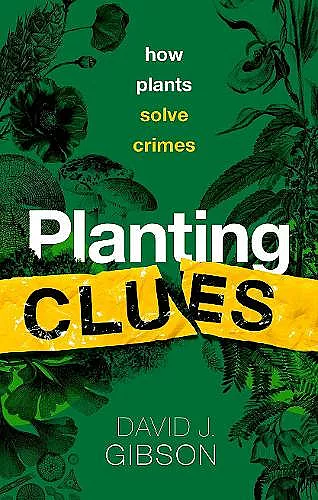Planting Clues
How plants solve crimes
Format:Hardback
Publisher:Oxford University Press
Published:25th Aug '22
Should be back in stock very soon

Discover the extraordinary role of plants in modern forensics, from their use as evidence in the trials of high profile murderers such as Ted Bundy to high value botanical trafficking and poaching. We are all familliar with the role of blood spatters or fingerprints in solving crimes, from stories in the media of DNA testing or other biological evidence being used as the clinching evidence to incriminate a killer. This book lifts the lid on the equally important evidence from plants at a crime scene, from the incriminating presence of freshwater plants in the lungs of a drowning victim, to rare botanical poisons in the evening gin and tonic, to exotic trafficked flowers and drugs. In Planting Clues, David Gibson explores how plants can help to solve crimes, as well as how plant crimes are themselves solved. He discusses the botanical evidence that proved important in bringing a number of high-profile murderers such as Ian Huntley (the 2002 Shoham Murders), and Bruno Hauptman (the 1932 Baby Lindbergh kidnapping) to trial, from leaf fragments and wood anatomy to pollen and spores. Throughout he traces the evolution of forensic botany, and shares the fascinating stories that advanced its progress.
The narrative offers an interesting experience for the reader, who may learn and be entertained at the same time. * F. W. Yow, CHOICE *
A great and fascinating read that will be devoured by both those lay folk into popular science and crime procedural stories alike, but also those who have studied biological sciences * Jonathan Cowie, SF2 Concatenation *
There is some genuinely interesting material here... You can't fault Gibson's enthusiasm for the subject - and I suspect would-be botanists will enjoy it, while murder mystery writers will gain some excellent ideas for methods that their CSI teams can use. * Brian Clegg *
A wide-ranging survey of forensic botany... [the book] has some great tales about how plants help solve crimes - and are used to commit them. * Kate Douglas, New Scientist *
Gibson is a brisk, lucid writer...very good at conveying complex technical information smoothly. * Jake Kerridge, Daily Telegraph *
Planting Clues opens up a world that few of us know about, and while the book is heavy on technical details, it manages to balance these with (often brutal) case studies that help to bring to life the many ways in which plants (and botanists) have helped to solve crimes. This makes the pages fly by. * Kit Gillet, Geographical *
A great book... Written in a very accessible way, Planting Clues should not only appeal to the general reader, but will also serve well as a textbook for an undergraduate course on forensic... a most welcome addition to the literature on plant-based forensics. * Nigel Chaffey, Botany One *
well-structured and readable * Margaret Graham, Frost Magazine *
Gibson's case studies aren't for the faint of heart... Armchair criminologists...will find plenty to like. * , Publishers Weekly *
Recommended reading for those interested in biology, forensic sciences, botany, and crime solving. * Defrosting Cold Cases *
David Gibson provides an engaging introduction, eminently readable...Not only is Planting Clues a great and fascinating read that will be devoured by both those lay folk into popular science and crime procedural stories alike, but also those who have studied biological sciences, are doing so, or are thinking of embarking on a bioscience course...I highly recommend [it]. * Jonathan Cowie, SF2 Concatenation *
This volume is an excellent, entirely new type of treatment of the subject matter, deeply researched, and clearly and succinctly written. * Shirley A. Graham, Missouri Botanical Garden, St. Louis, Missouri, The Quarterly Review of Biology *
Gibson's book includes a wide range of examples of 'forensic botany'...Gibson makes clear that taxonomic classification is at the heart of all forensic applications of botany, from Locard's dandelion to Wiltshire's palynomorphs. * Liam Shaw, London Review of Books *
ISBN: 9780198868606
Dimensions: 220mm x 142mm x 25mm
Weight: 376g
256 pages